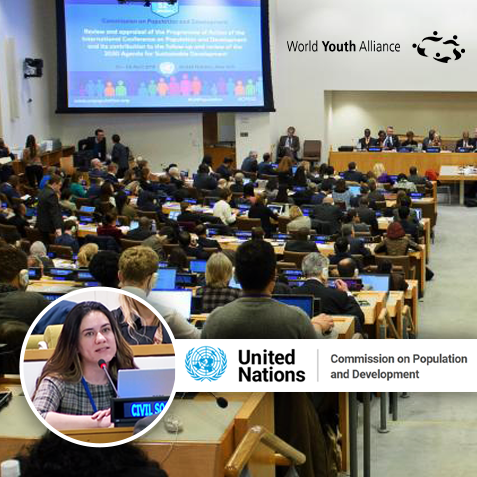April 10-14, 2023 — “They can promote the aspect of… comprehensive sexuality education in their national context[s]…[but] one country’s priorities cannot be made [a] priority for all,” Pakistan’s representative stated at the final day of the negotiations for the draft resolution of the 56th session of the Commission on Population and Development (CPD) at the UN Headquarters in New York. The CPD’s primary role is to monitor, review and assess the implementation of the Programme of Action of the International Conference on Population and Development held in Cairo, Egypt, in 1994.
Pakistan added, “We hope that this will not happen again. If we look at the very title of the resolution, it was ‘population, education and sustainable development’…. It was not ‘population, comprehensive sexuality education and sustainable development.’ For the sake of ‘comprehensive education on human sexuality,’ we have compromised ‘education’ as a whole and we feel really sorry today… for those children who have been deprived of the very basic and fundamental right to education.”
World Youth Alliance (WYA) Director of Advocacy Sofia Piecuch and Policy and Research Specialist Mislav Barišić led the WYA delegation at the 56th session of the CPD and provided analyses of the draft resolutions and gave language proposals to over 60 country delegations. WYA also submitted a written statement which is available online through the UN CPD portal here.
This year’s 56th CPD Session failed to adopt by consensus a draft resolution concerning the theme of population, education and sustainable development. Many delegates raised concerns on the lack of transparency in the process. The draft text underwent 3 negotiated revisions, followed by two versions prepared by the CPD Chair. The Chair’s first text was under a silence procedure, meaning that delegations approve it unless they “break silence” and voice disagreement.
Another major concern that resulted in heated discussion was the reference to many problematic elements in the document including mentions of “reproductive rights,” “sexual and reproductive health care services,” and “comprehensive education on human sexuality.” The latter term, a variation of “comprehensive sexuality education” from a 2014 CPD resolution, was the main point of contention between delegations. Many refused to have a text with this term, and others refused one without it.
On April 11, 22 delegations broke silence on the Chair’s text. The Commission met with these delegations in an attempt to find a way to improve the text. The Chair’s next text was not distributed until 10:24 pm on April 13th, less than 12 hours before delegations would be expected to approve it in the CPD’s last session. This text did not meet the expectations of the 22 delegations that broke silence. For one, it included a new paragraph which had not been negotiated. While the paragraph focused on parents’ role in guiding adolescents, it also called to “safeguard the right of adolescents to privacy, confidentiality, respect and informed consent” and to “remove legal, regulatory and social barriers to reproductive health information and care for adolescents.” The text also retained a paragraph that called for “comprehensive sexual and reproductive health services” as well as “comprehensive education on human sexuality.”
In the last session, vocal opposition to the resolution was expressed by Iraq, Belarus, Mali, Nigeria, Yemen, Syria, Algeria, Cameroon, Gambia, Russia, Indonesia, Nicaragua, Pakistan, the Philippines, Libya, Saudi Arabia, Malaysia, Senegal, Egypt, Mauritania, Guatemala, Iran, the Holy See, and Ethiopia. In light of these strong statements, the Chair withdrew the text.
The Chair could have called for a vote. However this would have been problematic since it would have been impossible to stop the resolution from passing and would create a precedent for voting on CPD resolutions, which weakens consensus and “hides” and “marginalizes” minority positions.
Last year, an expert group meeting leading up to CPD56 was held from September 6th-7th and a briefing on its substantive preparation was on October 27th. In both meetings comprehensive sex education was a major part of the conversation. At the time, WYA, as well as the other country delegations, expressed their confusion at this priority seeing as the theme of the session would be on education in general. Unfortunately, these concerns were not addressed, meaning that the discussions on CSE were the primary source of division during the negotiations.
It is unfortunate that the organizers did not consider member states’ concerns with the hyperfocus on comprehensive sex education during both the CPD negotiation and preparation sessions. In light of the controversy, the withdrawal of the text was a positive outcome for this CPD56.
Listen to WYA’S CPD56 statement:








